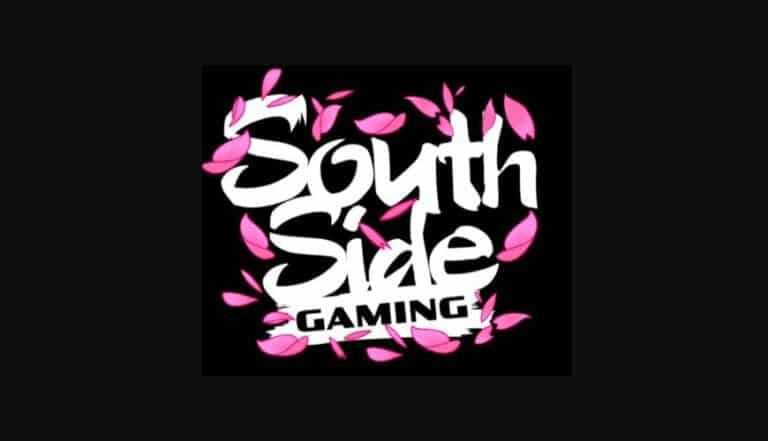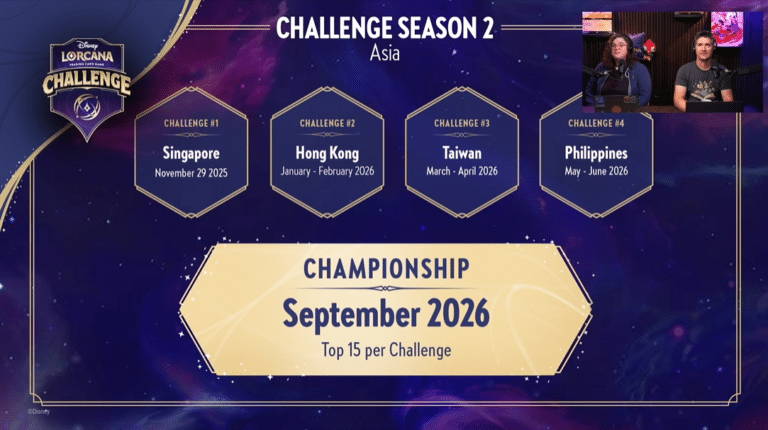Better be careful with your plays this weekend. Your Disney Lorcana judges now have Play Correction Guidelines!
Cabled has done it again, spotting the latest organized play resource for Disney Lorcana!
Disney Lorcana TCG Play Correction Guidelines *
* Note: It appears that the document has been taken down from Ravensburger site. If you still wish to access it, you may check it out on the wiki linked here.
The document is 8 pages long and covers the corrective actions that can be taken, such as warnings and game/match losses, along with when they should be applied. Similar to the TCG Tournament Rules, we recommend that all players read through and familiarize themselves with the entire guidelines, especially if you are planning to attend a tournament.
1. Definition of Corrective Actions
Caution: This is the most basic level of corrective action. The player is cautioned that they should play more carefully to avoid making this error in the future. It is not tracked or recorded.
Warning: The player receives a verbal Warning that they have committed an error and should be more careful in the future. This Warning is recorded and tracked, and it may be upgraded if further errors are committed in the same tournament.
Game Loss: The player immediately loses the game currently in progress. If this corrective action is applied between games, then the player loses the next game they would play. If both players would receive a Game Loss for the same game, instead the corrective actions are recorded but the game is played as normal. These are known as “offsetting” corrective actions.
Match Loss: The player immediately loses the match currently in progress. If this corrective action is applied between rounds, then the player loses the next match they would play. If both players would receive a Match Loss for the same match, these corrective actions do not offset. Both players are given a loss for the match.
Disqualification: The player immediately loses the match currently in progress (if
any) and is dropped from the tournament.
The document in addition states that corrective actions can even be applied to spectators if necessary.
Reports can also be sent in to lorcanaop@ravensburger.com, with the key event, player and spectator information, and a brief description of the incident included.
2. Rule Errors
If a player receives a third Warning within a single category of Rule Error in a tournament, that third Warning should be upgraded to a Game Loss.
2.1 Hidden Information Error
Definition: A player sees a card they were not allowed to see, such as a card in their inkwell.
Corrective action: Casual – Warning / Competitive – Warning
Remedy: If the seen card was added to the inkwell through the normal once-per turn action, reveal the card to the opponent, then return it to the inkwell. If the card was added by any other means, reveal it to the opponent, then shuffle it into the player’s deck and replace it with a random card from that deck. In either case, strongly reinforce that looking at cards in your inkwell is against the rules. Further
violations should be handled as Unsporting – Cheating.
If the seen card was not in an inkwell, shuffle it into the random portion of its owner’s library.
2.2 Card Count Error
Definition: A player has an incorrect number of cards in their hand or inkwell.
Corrective action: Casual – Warning / Competitive – Warning
Remedy: If a player has too few cards in their hand, instruct them to draw cards equal to the difference. If the player has too many cards, investigate to identify which cards definitely belong in that player’s hand. Once this is done, remove cards at random from the remaining cards until the hand is the correct size. Shuffle the removed cards into the random portion of the player’s deck.
If a player’s inkwell contains too few cards, investigate to identify which card is missing, if possible. If the identity of the card is unknown, add a random card from the player’s deck facedown. The players do not get to learn the identity of the card.
If a player’s inkwell contains too many cards, investigate to identify which cards definitely belong in the inkwell. Once this is done, remove random cards from the remaining inkwell cards until the inkwell contains the correct number of cards. Shuffle the removed cards into the random portion of the player’s deck.
2.3 General Rule Error
Definition: A player commits an in-game rule violation that does not fall under Inkwell Errors or Card Count Errors. A player missing an effect that uses the word “may” has not committed this infraction.
Corrective action: Casual – Caution / Competitive – Warning
Remedy: Either rewind the game to the point of the error or leave the game as is.
If choosing to rewind, this must be done with the approval of the Head Judge. If leaving the game as is, be sure to handle any game objects that are currently illegal (such as a character with damage equal to or greater than its Willpower that hasn’t been banished) before instructing the players to continue playing.
3. Tournament Errors
If a player receives a second Warning within a single category of Tournament Error in a tournament, that second Warning should be upgraded to a Game Loss
3.1 Tardiness
Definition: A player arrives up to 10 minutes late to their match or turns in their deck list after the deadline
Corrective action:
| If the player is late by: | 0–2 minutes | 2–10 minutes | Over 10 minutes |
| Casual | Caution | Warning | Match Loss + drop |
| Competitive | Warning | Game Loss | Match Loss + drop |
Remedy: Issue the affected match a time extension equal to the time the player was late.
If a player is more than 10 minutes late to their match, they should be issued a Match Loss and be dropped from the tournament. If the player shows up before the end of the round, they may be re-enrolled at the discretion of the Head Judge.
3.2 Slow Play
Definition: A player takes an inordinately long time to make a play decision. A player should be prompted to make a play if the judge believes they may be playing too slowly, and further delay should result in this corrective action.
Corrective action: Casual – Caution / Competitive – Warning
Remedy: If the match is still going when time is called in the round, the match should be an additional two extra turns for the end-of-match procedure.
3.3 Deck Error – Minor
Definition: A player has a deck that is illegal deck in a minor way. Examples include playing with a 39-card Limited deck or with more than 4 of a single card in a Constructed deck and catching it themselves. This also covers situations where a deck is illegal but the corresponding deck list is legal.
Corrective action: Casual – Warning / Competitive – Warning
Remedy: For a Limited deck that is under 40 cards, randomly add cards from the player’s remaining card pool until the deck minimum is achieved. For a Constructed deck that breaks the 4-card limit, remove the excess cards until the error is corrected. If this causes the deck to no longer be 60 cards, then the corrective action is Deck Error – Major. If a deck is illegal but has a legal list, alter the deck to match the list.
3.4 Deck Error – Major
Definition: A player has an illegal deck in a major way. Examples include playing a Constructed deck with 59 cards or more than two ink colors represented.
Corrective action: Casual – Game Loss / Competitive – Match Loss
Remedy: If the deck list and deck both contain too few cards, the player must obtain and add cards until the deck minimum is satisfied. If the deck contains too many ink types, the inks with the fewest cards must be removed and replaced with cards of the two ink types most represented. If there is a tie, randomly determine which ink is to be removed.
3.5 Limited Error
Definition: A player makes an error during a draft, such as looking at cards already drafted at Competitive Level.
Corrective action: Casual – Caution / Competitive – Warning
3.6 Communication Error
Definition: A player incorrectly represents information in a game, and their opponent makes a gameplay decision based on the erroneous information.
Corrective action: Casual – Caution / Competitive – Warning
Remedy: With the approval of the Head Judge, the game may be rewound to the point of the decision made based on the incorrect information.
3.7 Marked Cards
Definition: A player has cards or card sleeves that can be visually distinguished from the rest of their deck.
Corrective action: Casual – Warning / Competitive – Warning
Remedy: The player should replace the sleeves or cards with unmarked versions at their earliest convenience.
Upgrade: If the Head Judge determines that the marked cards are identifiable easily enough to be significantly abused, the player should replace the sleeves or cards immediately. If the tournament is at Competitive, the corrective action should be upgraded to a Game Loss.
3.8 Outside Assistance
Definition: A player or spectator gives or receives hidden information or play advice while currently playing a match, or a player consults notes made outside of the current match.
Corrective action: Casual – Game Loss / Competitive – Match Loss
Remedy: If the person committing the infraction is a spectator, they should be asked to leave that match.
4. Unsporting Conduct
If a player receives a second Warning within a single category of Unsporting Conduct in a tournament, that second Warning should be upgraded to a Game Loss.
4.1 Unsporting – Minor
Definition: A player takes an action that causes minor distress or discomfort to others.
Corrective action: Casual – Warning / Competitive – Warning
Remedy: Most Minor Unsporting infractions will be unintentional, so the player must be informed of why their behavior was distressing or discomforting and remedy the situation if possible.
4.2 Unsporting – Major
Definition: A player takes an action that could reasonably be expected to cause major discomfort or alienation, particularly with regard to discrimination based on a protected class (race, gender, ethnicity, etc.).
Corrective action: Casual – Match Loss / Competitive – Match Loss
Remedy: The players should be separated immediately, and the offending player must be educated as to why the behavior is unacceptable. If the player is unrepentant and refuses to acknowledge that their conduct was unacceptable, the Head Judge is strongly encouraged to upgrade this corrective action to Unsporting – Severe.
4.3 Unsporting – Severe
Definition: A player takes an action that significantly disrupts the tournament and/or risks injury to another person.
Corrective action: Casual – Disqualification / Competitive – Disqualification
Remedy: The player should be removed from the venue though any safe means available. The Tournament Organizer may choose to involve local authorities if they deem it necessary.
4.4 Cheating
Definition: A player intentionally breaks a game rule or tournament rule in order to gain an advantage. This infraction also includes lying to a Tournament Official or intentionally playing slowly to take advantage of a time limit.
Corrective action: Casual – Disqualification / Competitive – Disqualification
4.5 Improper Match Result
Definition: A player offers an incentive in exchange for a concession or accepts such an offer, or players determine a match result by an outside-the-game method such as flipping a coin or rolling a die.
Corrective action: Casual – Match Loss / Competitive – Disqualification
Remedy: The Head judge is responsible for assuring that the players involved are educated as to why this behavior is unacceptable.
If anyone should have any feedback and suggestions to make regarding this document, the team invites everyone to contact them at LorcanaOP@ravensburger.com to provide it.



